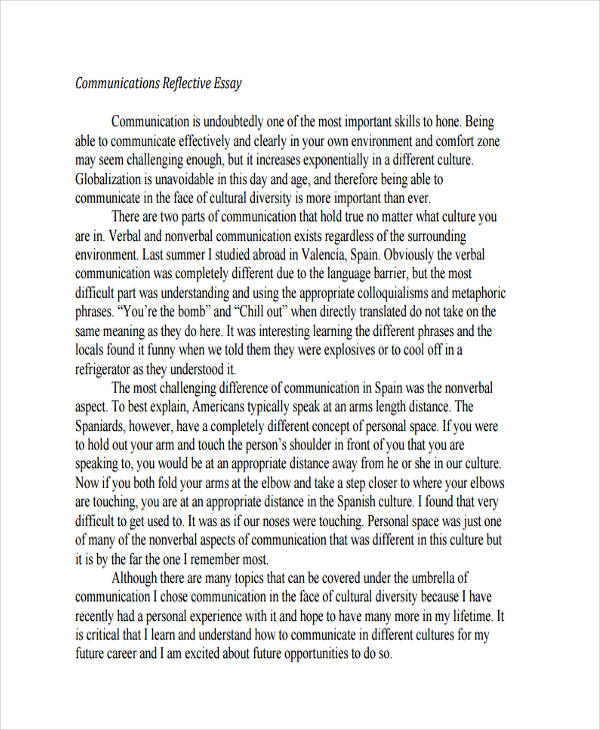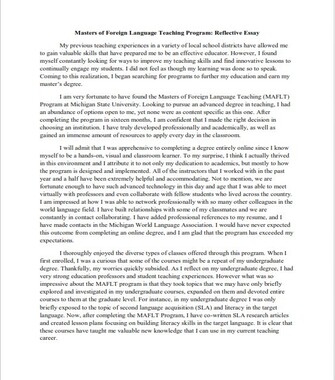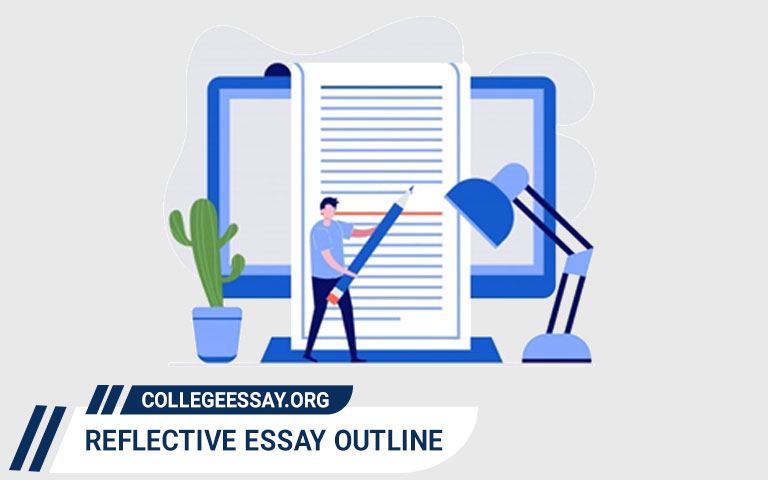‍Past Experience: Volunteering in an animal shelter.
Description: The shelter is located near a vet clinic. I was there with three other volunteers and the shelter’s owner.
Reflection: I was really surprised by the number of homeless animals and how tame they were. Working there was a very enriching experience.
If your instructor asks you to format your paper in APA or MLA style, here are a few shortcuts:
- Thesis statement: The reflective essay thesis statement should include that вЂ˜past experience’ information
Even though a reflection paper is personal, you should keep it professional. Avoid slang and use only correct spelling and grammar. Don’t use abbreviations.
Reflective Essay in MLA Format

- Analyze and conclude what you’ve read, heard, or seen
- Make connections between the text and yourself, or other texts and the world
- Think about what you’ve learned and how you can, or will, use the newly acquired information
- Write subjectively (from your point of view) and help identify your interests
A reflective paper is a very personal type of writing because it includes your feelings and opinions about something. Before adding something into your paper, ask yourself whether or not this information is appropriate to include.
A reflective paper is the type of academic writing assignment with the aim of revealing more details about your identity.
A reflection paper is a very common type of paper among college students. Almost any subject you enroll in requires you to express your opinion on certain matters. In this article we will explain how to write a reflection paper, and provide you with examples and useful tips that will make the writing process easier.
You can write down specific quotes, predispositions you have, things that influenced you, or anything memorable. Be personal and explain, in simple words, how you felt.
Here are some reflection paper topic examples for you to keep in mind before preparing to write your own:
- How my views on rap music have changed over time
- My reflection and interpretation of Moby Dick by Herman Melville
- Why my theory about the size of the universe has changed over time
- How my observations for clinical psychological studies have developed in the last year
What Is a Reflection Paper

- Short and Sweet – Most reflection papers are between 250 and 750 words. Don’t go off on tangents. Only include relevant information.
- Clear and Concise – Make your paper as clear and concise as possible. Use a strong thesis so that your essay can follow it with the same strength.
- Maintain the Right Tone – Use a professional and academic tone—even though the writing is personal.
- Cite Your Sources – Try to cite authoritative sources and experts to back up your personal opinions.
- Proofreading – Not only should you proofread for spelling and grammatical errors, but you should proofread to focus on your organization as well. Answer the question presented in the introduction.
After you choose your topic, write a short summary about what you have learned about your experience with that topic. Let readers know how you feel about your topic—and be honest. Chances are that your readers will likely be able to relate to your opinion or at least the way you form your perspective, and that will help them have a better understanding of your reflection.
Now that we went over all of the essentials about a reflection paper and how to approach it, we would like to show you some examples that will definitely help you with getting started on your paper.

It sounds obvious, but the reflective process forms the core of writing this type of essay, so it’s important you get it right from the outset. You need to really think about how the personal experience you have chosen to focus on impacted or changed you. Use your memories and feelings of the experience to determine the implications for you on a personal level.
This is an especially important step when you’re tackling a reflective essay – there can be a tendency for people to get a little ‘lost’ or disorganised as they recount their life experiences in an erratic and often unsystematic manner. But if you develop a thorough outline (this is the same as a ‘plan’) and ensure you stick to it like Christopher Columbus to a map, you should do just fine as you embark on the ultimate step of writing your essay. If you need further convincing on how important planning is, we’ve summarised the key benefits of creating a detailed essay outline below:
Although a reflective piece of writing is focused on personal experience, it’s important you draw on other sources to demonstrate your understanding of your experience from a theoretical perspective. It’ll show a level of analysis – and a standard of reliability in what you’re claiming – if you’re also able to validate your work against other perspectives that you find. Think about possible sources, like newspapers, surveys, books and even journal articles. Generally, the additional sources you decide to include in your work are highly dependent on your field of study. Analysing a wide range of sources, will show that you have read widely on your subject area, that you have nuanced insight into the available literature on the subject of your essay, and that you have considered the broader implications of the literature for your essay. The incorporation of other sources into your essay also helps to show that you are aware of the multi-dimensional nature of both the learning and problem-solving process.
As a starting point, you might want to think about some important experiences in your life that have really impacted you, either positively, negatively, or both. Some typical reflection essay topics include: a real-life experience, an imagined experience, a special object or place, a person who had an influence on you, or something you have watched or read. If you are writing a reflective essay as part of an academic exercise, chances are your tutor will ask you to focus on a particular episode – such as a time when you had to make an important decision – and reflect on what the outcomes were. Note also, that the aftermath of the experience is especially important in a reflective essay
The format

Once you’ve successfully emptied the contents of your memory, you need to start reflecting. A great way to do this is to pick out some reflection questions which will help you think deeper about the impact and lasting effects of your experience. Here are some useful questions that you can consider:
– Write using the first-person narrative, ensuring that the tone of your essay is very personal and reflective of your character.
These signpost questions should help kick-start your reflective process. Remember, asking yourself lots of questions is key to ensuring that you think deeply and critically about your experiences – a skill that is at the heart of writing a great reflective essay.

A reflective essay's structure can slightly change based on who the audience is.
A student reflection essay follows the conventional essay structure.
They seem easy enough to write but once you've sat down to start.
What makes that essay reflective is that you, as a writer, analyze a past event from the present.
In a reflective essay, you share your own experience with some event or your thoughts regarding an article, lesson, lecture, etc.

Reflective essay by definition is a kind of writing that requires the author to inform the reader about his or her attitude, idea or impression our professional team of writers knows perfectly what it takes to write a perfect reflective essay.
Reflective essay writing is a study based on personal experience that required enough time for.
2 Reflective Essay Examples and What Makes Them Good from www.kibin.com Your main goal is to state your opinion and analyze a certain issue, referring to some of your past experiences and reflecting on them—not. Reflective essays are those sorts of essays that seem oh so easy, and yet oh so hard to write, all at the same time. When you've been assigned a. How do i write a reflective essay? In fact, you could be asked to write a reflective essay that is b. An explanation of a reflective essay. In a reflective essay, the writer examines and writes about his personal experiences. As long as you use tips by handmade writing, you'll end up having a great piece. Here are five key writing tips to keep in mind while writing a reflective essay. It is almost like a diary remember: Write a reflection essay on infection control. To put it simply, reflective essays the purpose of writing a reflective essay is to provide a platform for the author to not only recount a particular life experience, but to also explore.
Write a reflection essay on infection control. This is very important so that your readers as aforementioned, reflective essay examples don't have a standard format. Time to summarize the most crucial points of what you've read so far. An explanation of a reflective essay. By writing a reflective essay you can capture some of these ephemeral emotions and make sense of who you really are. Ultimate guide to write a successful paper easily.

"CollegeEssay" is the #1 Ranked Online home for great academic writing, essays, research papers, and graduate theses.
Writing a reflective essay is a way of describing your personal experience and explain how those life experiences influenced them and how it changed their lives.
The structure of the college essay depends on the topic and purpose of the essay. A properly structured outline will help you to present the necessary information in the essay easily. When writing the reflective essay outline, keep some key points in mind, and create the perfect essay.
Describe the main issues related to the topic. Use quotations and cite sources related to the literature. Include the precise examples of the events that occurred during this period.
Tips on Writing the Reflective Essay

- Describe the significance of the essay
- Identify personal intentions and link them with previous experiences.
- Think about future options
- Recognize your own beliefs
- Organize information in a sensible manner.
- Categorize the main points
The third part will be related to your personal reflections about the event. You need to add supporting details about the event and make a successful essay. In this paragraph, you describe what lessons you have learned after experiencing the event.
It is the first statement that the reader read and decide to read the entire essay or not. The hook statement should start with a quote or an interesting question.
- Use Time New Roman
- The font size is 12, and all text should be double-spaced.
- The page number is located at the top right corner of the page.
- The title page, abstract, main body, and references are the main parts of the essay.

